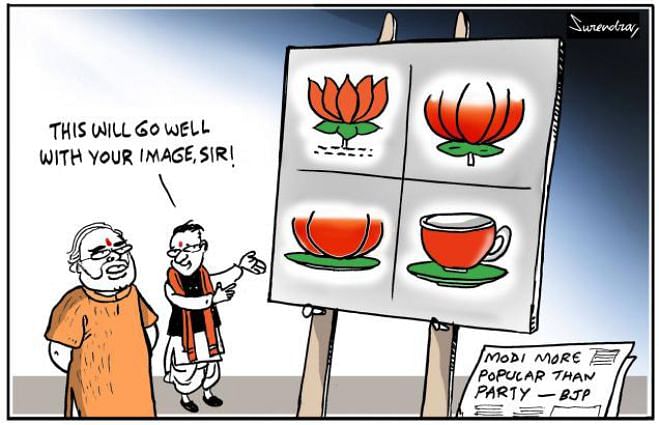Post Indian election: The shape of things to come!
Post Indian election: The shape of things to come!

REPORTEDLY, the BJP will have spent about five billion Indian Rupees on advertisement by the time the month-long largest democratic show on earth ends in India on May 12. And the man whose pictures dominate the festoons and billboards and newspaper and TV ads is Narendra Modi, whom most see as the next Indian prime minister. However, not all take that as given, considering that there are many aspirants within the party to the post of the PM.
And the slogan, 'is baar Modi Sarkar' (This time it will be Modi government) accompanies all the ads. And this is what irks the observers, who see the very expression as strange, as much as it does the grassroots workers. It seems that the BJP as a party has been subsumed by the persona of Modi, much to the chagrin of the grassroots party supporters who naturally would want the party and not any individual to dominate the political discourse. And there is gripe among the party workers too that some BJP policy makers should choose to label the next government as 'Modi' rather 'BJP' government. Thus one sees a new turn in Indian politics where in a parliamentary form the question that is asked is which party will win, not, unlike a presidential form, who will win.
But why is so much focus on the man and not the party, unlike in the past? It is because of his political background and ideology that he has not only nurtured but also implemented, having been a member of the RSS since his childhood. And RSS is a platform that hosts other organisations of similar hue professing Hindu nationalism. While one cannot fault anyone for espousing a particular brand of nationalism, the core value that sustains it remains an important factor. In the case of RSS the alarming aspect is that the underlying value of the group, and by implication all those that share the same platform, is motivated by is the ideology of fascism, adopted, according to scholars, as a deliberate policy. And record shows that there had been close interaction in the 1930s between RSS representatives and Mussolini.
But if his ideological affiliation is fear-inducing his record as the CM of Gujarat, of sponsoring and abetting the killing of Muslims in 2002, done with the help of the state agencies is a disgraceful narrative. And no matter all the clean chits that he flaunts in his defence, nor all the tears he sheds now, can wash out a word of the litany of his infamy. The man, if he is finally chosen to lead the BJP-led alliance government, will bring to the office of the Indian prime minister a person with blood-stained hands. And it is with some strong reasons that the Economist in its lead of April 5 suggests that his coalition partners should hold out for a prime minister other than Mr. Modi, should victory go to BJP.
But far be it for me or anybody else to suggest who India's next prime minister should be. It is for the people of India to choose their leader. But that notwithstanding, for Bangladesh, as indeed for any of India's neighbours, which party is in power in Delhi and who leads that party in the parliament is of extreme importance. And on that issue, Bangladesh-India relations should BJP get the Delhi Masnad, various opinions have been articulated.
We have been assured by the Indian High Commissioner to Dhaka that there would be no change in India's stance towards Bangladesh with the change of government. And very recently, statements attributed to our Deputy High Commissioner in New Delhi echoed similar appraisal. I agree with both but do so with not a little bit of misgiving, and feel no reason to be elated that there would be no change in India's Bangladesh policy.
In fact, except for a brief Morarji Desai period, there has never been a dramatic shift in India's policy towards Bangladesh with change of government in India. Unlike Bangladesh, foreign policy in India is driven by the head and not heart.
Notwithstanding personal relationship between leaders of the Awami League and Congress that lends a natural predisposition towards each other, India's policy decisions have been based entirely on the need to uphold their national interest, as they should. Neither Hilsha nor Jamdani diplomacy has paid off for Bangladesh.
Regrettably, no change means that the most important issues for Bangladesh, Teesta and the LBA, particularly the exchange of enclaves, will remain unresolved. Further, as a Bangladeshi, my fear is compounded by the prospect of the BJP government again using the so-called infiltration issue to put pressure on the government of Bangladesh. The recent comments of Modi and Subramaniam Swami (“Hindu migration issue, and ceding land to India, both of which we shall deal next week) are a very good indication that these issues are likely to be ratcheted up in future. Is the AL taking note?
The writer is Editor, Op-ed and Defence & Strategic Affairs, The Daily Star